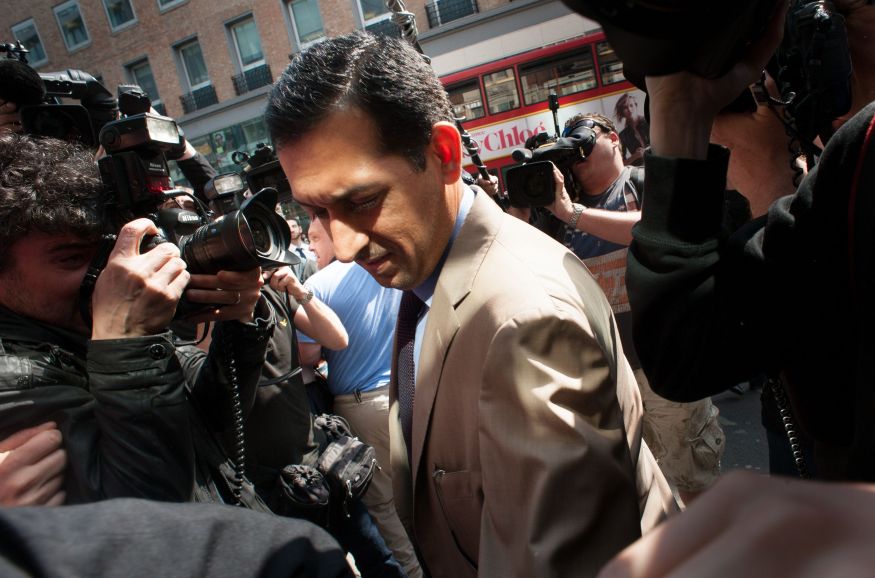The Independent's journalism is supported by our readers. When you purchase through links on our site, we may earn commission.
Godolphin trainer's disgrace complete with eight-year ban
BHA disciplinary panel bars horses injected with steroids from running for six months

The British Horseracing Authority has completed the astounding, headlong fall from grace of Mahmood al-Zarooni by banning him for eight years. On Monday evening, the BHA had shocked the racing world by announcing that 11 of the Godolphin trainer's horses had tested positive for anabolic steroids in random testing of 45 horses at his Newmarket stable on 9 April. It took only 72 hours to convene a disciplinary panel and pronounce a verdict on Zarooni – leaving observers divided as to whether the regulators had been merely ruthless, or reckless.
In a way, it hardly mattered whether he was banned for eight minutes or eight years. His employer, Sheikh Mohammed, has professed such fury over the humiliation of his elite stable that he has shut its gates, pending tests on every horse. The 37-year-old Zarooni's career is in ruins.
Simon Crisford, the Godolphin manager, said after the hearing that "the vet's assistant had no idea what he was injecting" and that he "had a direct order" from the trainer. "This is a terrible situation," Crisford said.
"Mr Al-Zarooni acted with awful recklessness and caused tremendous damage, not only to Godolphin and British racing. I think it will take a very long time for Godolphin to regain the trust of the British public. We're shocked and completely outraged by the actions he has taken."
As soon as the sensation had erupted, the Godolphin website quoted Zarooni as professing regret for "a catastrophic error" in administering ethylestranol to seven horses and stanozolol to a further four; he subsequently admitted that four other horses not tested by the BHA had been given steroids. He claimed that he had been unaware that he was breaching any rules, as the horses were out of competition. This would have been the case in certain overseas jurisdictions, but Crisford said that he did not find that protest of naïvete credible. "Everyone knows you can't use steroids in England," he declared.
Zarooni issued another contrite statement. "I accept it was my responsibility to be aware of the rules," he said. "I would like to apologise to Sheikh Mohammed, as well as to all those involved with Godolphin, and the public who follow British racing."
The BHA had initially been told the trainer would have a legal representative as he answered charges before its disciplinary panel. In the event, he faced the music on his own. It seems as though no exculpation was ever going to be offered. His name was on the licence, after all, and the rules specify strict liability for trainers in such circumstances. But the BHA stressed that its investigation had established Zarooni's direct accountability. It also emerged after the hearing that the BHA will conduct the horse-by-horse testing at Moulton Paddocks, the yard at the centre of the scandal.
The 15 horses known to have received steroids were meanwhile suspended for six months – almost the entire Flat season. Certify, previously among the leading fancies for the 1,000 Guineas on Sunday week, is among those who must remain idle until 9 October. Jamie Stier, the BHA director of raceday operations and regulation, explained: "The suspension reflects the period beyond which the BHA is confident that the horses can have derived no performance-related benefit from these prohibited substances."
Paul Bittar, its chief executive, insisted that the BHA had not shown undue haste. "As soon as the nature and number of positives became apparent, we recognised a number of challenges for the sport and the BHA, initially in the very short term," he said. "The immediate priority was to establish how the prohibited substances came to be present in the horses' samples. Secondly, in view of the potential repercussions for the sport and the profile of the races for which some of the horses held entries, it was in the public's interest, as well as that of the BHA and Godolphin, to progress the disciplinary procedures as quickly as possible."
Ultimately, he felt that an "exceptional" case also had benefits. "We believe the outcome is an endorsement for the effectiveness of British racing's dope-testing programme," he said. "[It] will serve to reassure the public, and the sport's participants, that use of performance-enhancing substances in British racing will not be tolerated."
Subscribe to Independent Premium to bookmark this article
Want to bookmark your favourite articles and stories to read or reference later? Start your Independent Premium subscription today.

Join our commenting forum
Join thought-provoking conversations, follow other Independent readers and see their replies